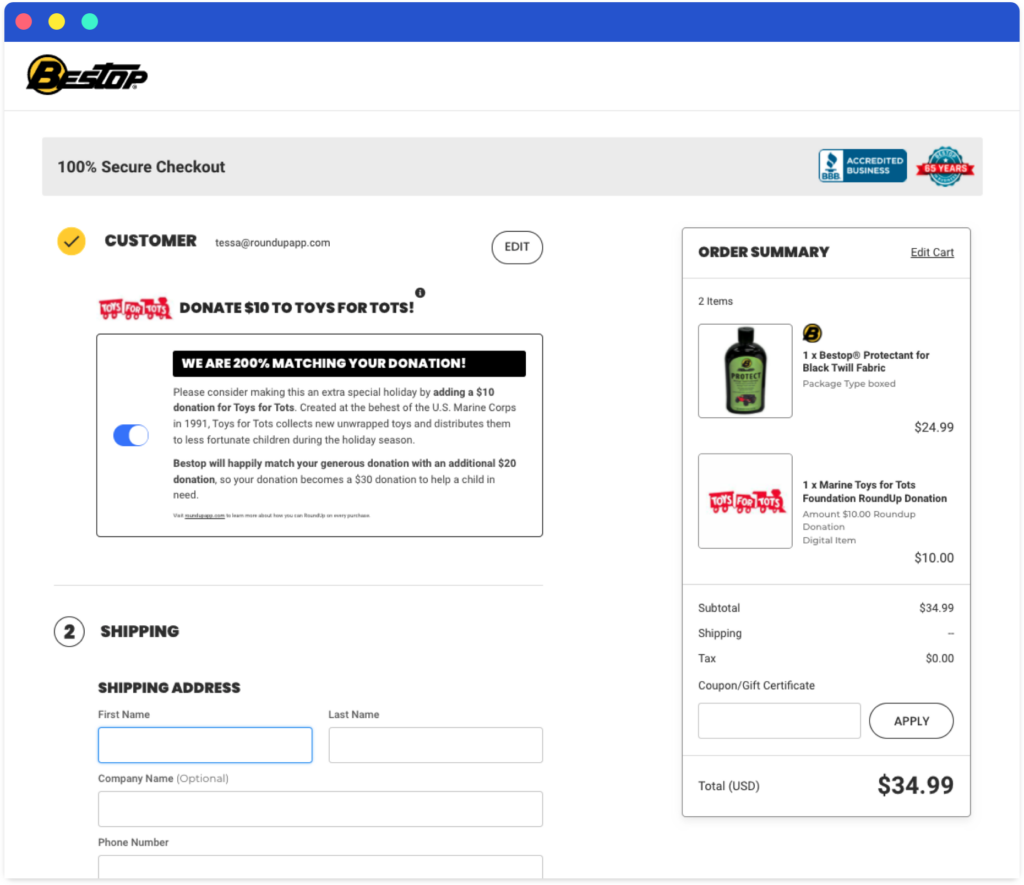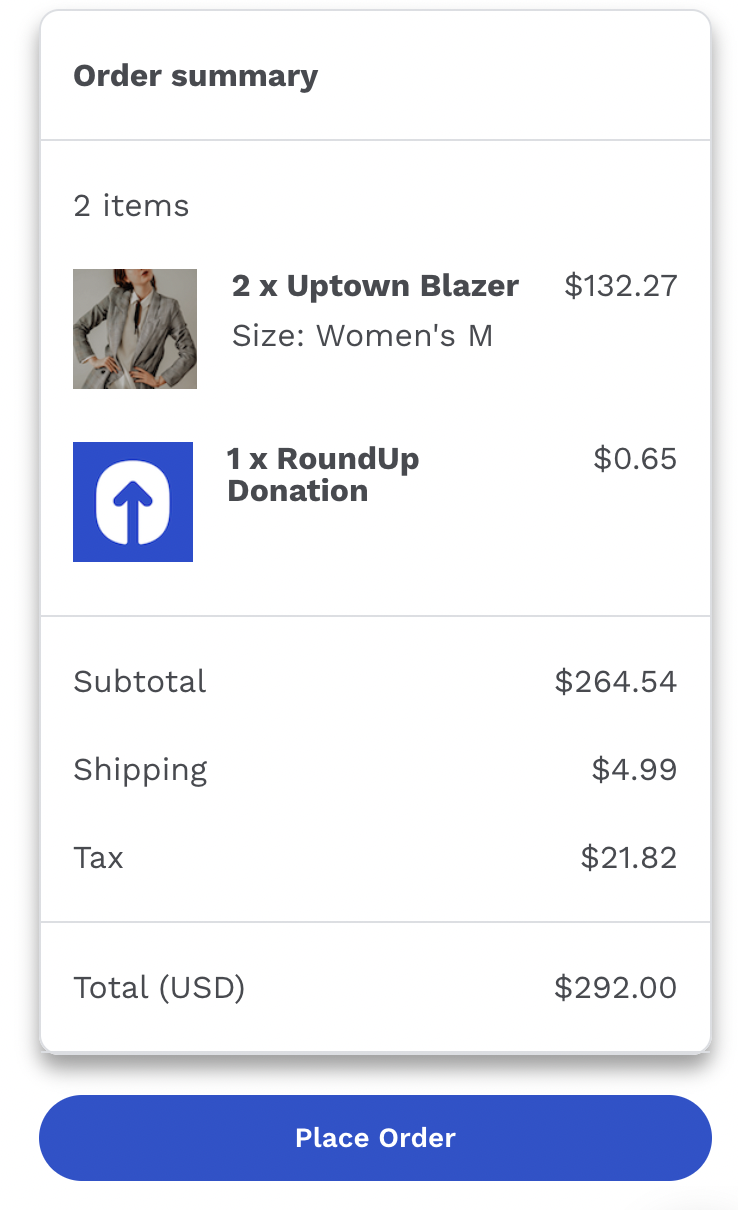The term cause-related marketing is generally used to refer to mutually beneficial partnerships between corporations and nonprofits. In these types of marketing campaigns, corporations partner with nonprofit organizations to boost their sales while having a positive impact on a nonprofit and the cause they support.
To practice cause-related marketing, it’s important that nonprofits have the tools they need to integrate their nonprofit with a corporation’s product. At RoundUp App we provide seamless integration for Ecommerce corporations looking to practice cause marketing with thousands of nonprofits across the country.
What is cause-related marketing?
The term cause-related marketing is generally used to refer to mutually beneficial partnerships between corporations and nonprofits. In these types of marketing campaigns, corporations partner with nonprofit organizations to boost their sales while having a positive impact on a nonprofit and cause they support.
To practice cause-related marketing, it’s important that nonprofits have the tools they need to integrate their nonprofit with a corporation’s product. At RoundUp App we provide seamless integration for Ecommerce corporations looking to practice cause marketing with thousands of nonprofits across the country.
Cause-related marketing VS traditional marketing
Cause-related marketing might differ from the traditional forms of marketing practiced by nonprofits because it is driven primarily by a corporation rather than a nonprofit.
In a traditional fundraising marketing campaign, the nonprofit selects the message and attempts to compel potential donors to donate through various forms of paid and organic advertising. However, in these campaigns, corporations generally reach out to nonprofits aligned to their strategic business goals first.
An incredibly common form of cause-related marketing takes the form of rounding up or providing additional donations after a customer purchases something in a physical store or online. Ecommerce companies take advantage of plugins like RoundUp At Checkout to compel their customers to donate to a given nonprofit at checkout as opposed to donating directly to the nonprofit through fundraising emails, ads, or events
Effective cause-related marketing strategies
Cause-related marketing works best when the product or company working with a nonprofit aligns closely with the cause of a nonprofit. But there are multiple types of campaigns corporations can use to effectively drive sales and increase donations.

Individual product sales
Companies practice this type of cause-related marketing frequently by connecting individual products they sell to nonprofits. Think of big campaigns like the (Red) campaign in which products are branded to increase awareness of HIV prevention globally.
Other examples of this type of strategy involve specially branded products that consumers buy knowing that a portion of sales made from that product is donated directly to a nonprofit.

Events and fundraisers
Another key way that corporations and nonprofits work together is through in-person or branded online events and fundraisers. These types of campaigns might run long-term and usually involve a series of strategic events and fundraisers throughout a year where corporations partner with nonprofit organizations to bring awareness to causes.
In this type of campaign nonprofits and companies work together to align their business goals and plan events and fundraisers that mutually benefit each other.

Rounding up at checkout campaigns
Companies use this type of cause-related marketing to entice customers to donate at the time of purchase. This can take two forms. The first is donations added to purchases at physical stores like grocery or clothing stores.
The second type takes place online when eCommerce brands and companies use plugins like RoundUp at Checkout to add additional donations to customers’ carts before checking out.
Supporting nonprofits during crucial events
One of the crucial ways merchants and nonprofits can collaborate on cause-related marketing comes from events that have a direct impact on local communities. In the cases of natural disasters or sudden drastic events in a community, both customers and donors are more likely to give when they know that their donations are directly supporting their community.
Corporations can improve their brand identity while increasing sales by connecting their customers to nonprofit organizations combating a recent natural disaster or event.
Integrating corporations into the community
Another great way corporations can take advantage of cause-related marketing is to support a long or short-term project happening in their local communities.
When nonprofit organizations partner with local online retailers they can increase donations and awareness of their community cause. Since eCommerce businesses often have a dedicated local fanbase as well as a more global audience, they can increase the awareness of local organization. This results in more opportunities to fundraise beyond the local level while also integrating that corporation into the bedrock of the community.
The Cons of Cause-Related Marketing
While there are many benefits to corporations partnering with nonprofits, cause-related marketing can fail when not done correctly. The single biggest indicator of a potentially harmful partnership comes when corporations and nonprofits have a mismatch in strategic vision and identity.
For example, an environmentally conscious nonprofit might avoid partnerships with corporations that have a negative impact on the environment. Instead, they might choose to partner with local farms, organic and sustainable restaurants, or community plant shops that better suit their brand.
The key to deciding if a corporate partnership is right for your nonprofit is asking yourself a few critical questions. Does this improve or weaken our potential donors’ trust in us? Does your organization support the product being sold? Could this be misinterpreted by our audience?
Just the same, corporations want to do their due diligence to vet the nonprofits they partner with. When finding a nonprofit partnership, they want to first evaluate that nonprofit. A company might consider the size of a nonprofit, the scope of the work they do, and the overall effectiveness of its organization. They might look at things like past accomplishments, how donations are spent, or just overall donor satisfaction before moving forward with any cause-related marketing campaigns.
The Pros and Cons of cause-related marketing
PROS
Can increase a nonprofit’s reach.
Can increase a company’s sales.
Great way for companys to connect with consumers.
Great way for nonprofits to raise funds.
CONS
Mis-matched partnerships can feel inauthentic.
Can lead to less sales if customers don’t approve of nonprofit.
Can be harder to execute a campaign when multiple stakeholders are involved.
How RoundUp at Checkout helps cause-related marketing

While there are many benefits to corporations partnering with nonprofits, cause-related marketing can fail when not done correctly. The single biggest indicator of a potentially harmful partnership comes when corporations and nonprofits have a mismatch in strategic vision and identity.
For example, an environmentally conscious nonprofit might avoid partnerships with corporations that have a negative impact on the environment. Instead, they might choose to partner with local farms, organic and sustainable restaurants, or community plant shops that better suit their brand.
The key to deciding if a corporate partnership is right for your nonprofit is asking yourself a few critical questions. Does this improve or weaken our potential donors’ trust in us? Does your organization support the product being sold? Could this be misinterpreted by our audience?
Just the same, corporations want to do their due diligence to vet the nonprofits they partner with. When finding a nonprofit partnership, they want to first evaluate that nonprofit. A company might consider the size of a nonprofit, the scope of the work they do, and the overall effectiveness of its organization. They might look at things like past accomplishments, how donations are spent, or just overall donor satisfaction before moving forward with any cause-related marketing campaigns.

Putting it all together
Another great way corporations can take advantage of cause-related marketing is to support a long or short-term project happening in their local communities.
When nonprofit organizations partner with local online retailers they can increase donations and awareness of their community cause. Since eCommerce businesses often have a dedicated local fanbase as well as a more global audience, they can increase the audience size a local organization has access to. This results in more opportunities to fundraise beyond the local level while also integrating that corporation into the bedrock of the community.





